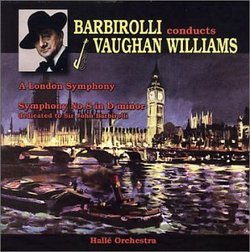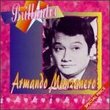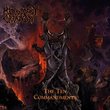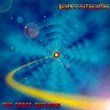| All Artists: Vaughan Williams, Barbirolli, Halle Orchestra Title: Symphonies 2 & 8 Members Wishing: 0 Total Copies: 0 Label: Dutton Labs UK Release Date: 8/14/2001 Album Type: Import, Original recording remastered Genre: Classical Styles: Historical Periods, Modern, 20th, & 21st Century, Symphonies Number of Discs: 1 SwapaCD Credits: 1 UPC: 765387102128 |
Search - Vaughan Williams, Barbirolli, Halle Orchestra :: Symphonies 2 & 8
CD DetailsSimilar CDs
|
CD ReviewsGlorious RVW from Glorious John Thomas F. Bertonneau | Oswego, NY United States | 11/26/2001 (5 out of 5 stars) "Ralph Vaughan-Williams had two gifted mid-century interpreters -- Sir Adrian Boult and Sir John Barbirolli. EMI promoted Boult's Vaughan-Williams more aggressively than it promoted Barbirolli's; Boult's stereophonic cycle of the RVW symphonies appeared attractively on long-playing records issued in the United States by Angel, a consortium of EMI and Capitol Records. Of Barbirolli's Symphonic RVW, the catalogue held two Angel editions -- the Second or "London" Symphony and the Fifth. Nevertheless on a variety of labels (Pye, Decca, EMI), Barbirolli recorded a majority of the symphonies (2, 5, 6, 7, 8), including platter-premieres of the Seventh and the Eighth (which RVW dedicated to Sir John). Barbirolli's RVW differs from Boult's in its wonderful suppleness or plasticity of phrase; Boult seems always to drive the music, a gesture that works for the Fourth and Sixth Symphonies, with their "modern" effects, but seems less congenial in the Third, Fifth, or Eighth. The "London" Symphony offers a kaleidoscope of brash and gentle elements that play alternately to Boult"s and Barbirolli's respective strengths, so it is the best test-case for revealing what each brought to RVW. What Boult does wonderfully is manage the great eruptions of the First Movement, after the slow nocturnal introduction, and the chromatic variations of the tragic march in the Finale. For my money, however, Barbirolli scores more points overall than Boult. In the fine, 1957 stereo recording, with the Halle Orchestra, now re-released by Dutton, the warmth of the First Movement's introduction, leading to the raucous outburst, is more evident than in any other recorded performance, even the later one that Sir John did for EMI. Barbirolli makes the great swaying music-hall theme (I suppose it qualifies as the second subject) truly jolly -- by taking it out of the metrical straight-jacket and applying generous rubato to its phrases. The Second Movement glows with an inner-fire; the Halle strings are particularly ripe in their sound. The Third Movement (both a Scherzo and a Nocturne) is diaphanous and mercurial. The Finale is heartbreaking in the pathos of its march and then -- in the lengthy epilogue -- as transfigured and ethereal as could be. The Eighth, from 1956, was the first recording. Here, too, Barbirolli seems to me to excel Boult in the refinement and clarity of his interpretation. A word about the recorded sound: These are vacuum-tube stereo recordings made in the Manchester hall where the Halle gave its concerts. I am a fan of archival performances; in this case, I am a fan of the archival sound. The sections of the orchestra are perfectly balanced on the acoustic stage as are individual contributors in each section. The sound is warm and natural. I know of know modern digital recording that has such realistic ambiance. This disc is a must for any RVW fan and should be considered by anyone just now beginning to explore the RVW symphonies." Very nice Barbirolli/Vaughan Williams Jeffrey Lee | Asheville area, NC USA | 06/16/2006 (5 out of 5 stars) "From the vicissitudes of the Thames and the impressions of other London locales to the noble tunes and motley reflections on the British empire, Sir John Barbirolli directs the Halle Orchestra in what is a moving musical portrait of Vaughan Williams' Second Symphony. He often bestows upon the music a marvelous resplendence, particularly in some of the composition's early passages but also during the march-like scherzo, where there is just the right amount of colorful brio. The same treatment is given to the exalted portions of the closing movement. There are some other fine Vaughan Williams Seconds out there, Handley's being among the most notable. Boult has his moments too, though I'm not especially enamoured with his intermittent tendency to push things a little too hard. Albeit, this earlier of Barbirolli's two Halle accounts from 1957, which, by the way, surpasses his later one ( 1967 ) is rich and colorful, and it possesses a grandness of spirit that is difficult to beat. The somewhat unconventional but alluring Eighth Symphony presents what I feel is an even more fascinating sound portrait. Some have characterized it as an instrumental experimentation by the composer, but who cares when such a delicious musical treat as this is served up ? In this work dedicated to him by the composer, Barbirolli again demonstrates his ability to infuse the music with a rich, warm glow, particularly in the third movement, ( somewhat reminiscent of the composer's Fantasia on a Theme of Thomas Tallis ) where he sustains a rapt spiritual presence. However, I find him just a bit less satisfying in conveying the drollness of the second movement and the exuberance of the fourth movement. Here Sir Adrian Boult's style seems closer to what is called for; namely, a little more of the light and lively quality. In any event, this finely engineered disc by Dutton is certainly a most welcome offering." An essential VW recording R. J. Claster | Van Nuys, CA United States | 07/25/2002 (5 out of 5 stars) "These performances of Barbirolli are justly acclaimed. No one else that I have heard conveys the diverse elements of A London Symphony, its dramatic vitality, humor, lyric beauty (no one equals him in the 2nd movement), mystery and tragic grandeur as effectively as he does. The 8th symphony, which he premiered, is still among the best performances available. Furthermore, the sound (which is in stereo) is quite good, so one need not make an allowance on that account."
|






